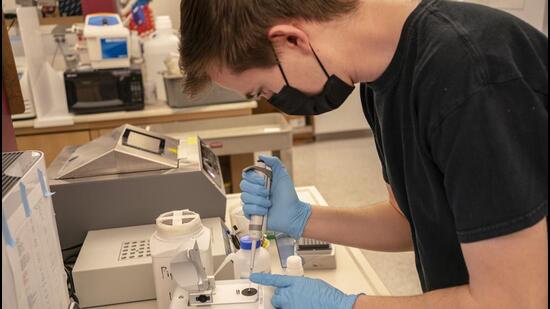AlphaFold: AI tool predicts structures for nearly all-known proteins
Proteins are commonly referred as the building blocks of life, made up on some combination of amino acids. It is easy to identify a protein by its constituent amino acid, but this is just one-dimensional information
NEW DELHI: An artificial intelligence tool developed by a Google sister company has predicted and published the structures of nearly all proteins, the building blocks of life, unlocking what may be one of the most influential databases for biological research.

AlphaFold, a tool developed by Alphabet-owned AI research company DeepMind Technologies, announced in a blog post by its CEO on July 29 that it has released the structures of over 200 million protein structures in collaboration with the European Bioinformatics Institute (EMBL-EBI). “This update includes predicted structures for plants, bacteria, animals, and other organisms, opening up many new opportunities for researchers to use AlphaFold to advance their work on important issues, including sustainability, food insecurity, and neglected diseases,” said the post by DeepMind’s chief executive, Demis Hassabis.
Proteins are commonly referred as the building blocks of life, made up on some combination of amino acids. It is easy to identify a protein by its constituent amino acid, but this is just one-dimensional information. What is important to understand is how these amino acids come together and “fold” to create a protein structure.
For instance, the Sars-Cov-2 has a protein that folds as a spike. This shape, therefore, is relevant for biologists because so that they can design antibodies and therapeutics to, say, neutralise this protein (thereby taking away its ability to infect more cells). This three-dimensional information is mostly gathered using cryo-electron microscopes.
In December, 2020, AlphaFold first crossed the threshold of predicting protein folding - or the structures - from merely the amino acid sequences with a high accuracy. In the months since, it has been used to create the database now released.
“Being able to ‘just download’ the whole prediction set is going to - I am sure - stimulate entirely new research directions. As important is the on-demand ‘oh I am going to make a mutation on my protein, I wonder where it is on the structure’ for ... *every known protein*,” wrote Ewan Birney, the director of EMBL-EBI, in a tweet.
The development is a reminder of the strides taken by AI technologies, which have demonstrated an ability to create art, play games like Go, write fiction and hold almost human-like conversations by earning from large datasets.
While AI technologies have excelled at single-use applications, like learning and predicting protein structures, there is a raging debate over whether such deep learning models can or already have achieved more human-like attributes of sentience. For now, there is wide consensus on one aspect: deep learning models will help unlock the next frontiers for science.





